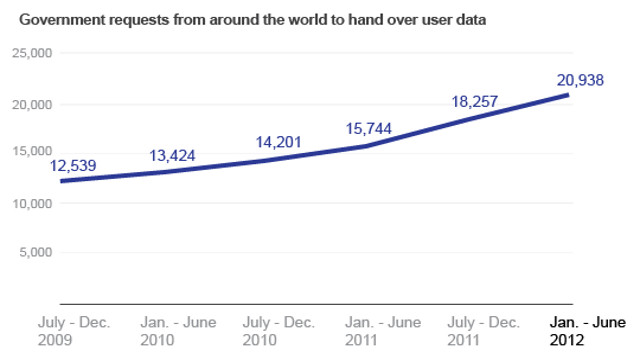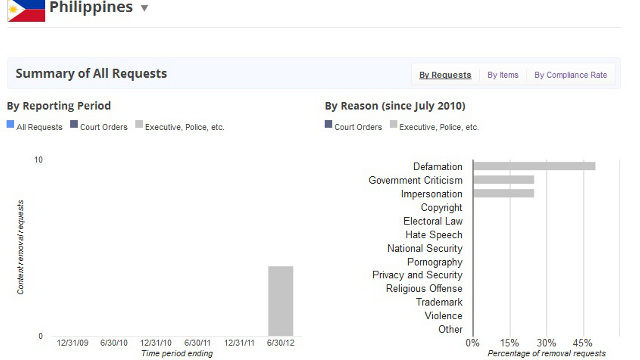SUMMARY
This is AI generated summarization, which may have errors. For context, always refer to the full article.

MANILA, Philippines – Transparency is important in gaining an accurate perspective on the realities of the world today. The online world is no different, and Google’s recent Transparency Report points toward the rise of government surveillance of online activities.
The report, released Wednesday, November 14, lists the number of requests a government has made for information, along with takedowns related to copyrights or government interests. Along with the number of requests for user data, the report also mentions the number of requests fully or partially complied with, as well as the number of users or accounts specified.
A blog post from Senior Policy Analyst Dorothy Chou that accompanied the release of the transparency report noted one clear trend from analyzing the 6 transparency reports released by Google since 2010: “Government surveillance is on the rise.”
Google’s user data request mechanics
According to the FAQ on user data requests, Google’s transparency report generally reveals statistics related to requests for data for criminal investigations. In cases where Google can’t tell if the demand is for criminal investigations or other uses, the company tries to add that to the data.
Google admits that the report isn’t perfect, as the statistics are “not 100% comprehensive or accurate.” The company did not add statistics that could compromise investigations due to the low number of requests.
The most requests made
In terms of worldwide data requests, the US government appears to have the most number of requests made and requests fully or partially complied with.
The US report notes that from January 1, 2012 to June 30, 2012, 7,969 user data requests relating to 16,281 user accounts were made. Of these requests, 90% were fully or partially complied with.
The report also mentions that the data requests “include those issued by U.S. authorities on behalf of other governments pursuant to mutual legal assistance treaties and other diplomatic mechanisms.”
Comparatively, the next closest country in terms of relative number of data requests and percentage complied with is India, with 2,319 requests over 3,467 accounts, 64% of which were fully or partially complied with.

The unnamed removal request
Google’s transparency report also mentions content removals. In this case, Google lists copyright holders and government organizations that have sent in requests for content to be taken down.
A look at Google’s transparency report for the Philippines indicates a relatively clean slate in terms of removals of content. There appears to have been only one set of requests made during the two years since the reports were released.
In this case, a set of 4 requests – two for defamation, one for impersonation, and one for government criticism – were made by a local mayor sometime between January 1, 2012 and June 30, 2012.
Google’s report states that it “received a request from the office of a local mayor to remove five blogs for criticizing the mayor.” The company did not remove content in response to the request. The report did not give any further information that might identify the mayor who made the request.
The Philippine connection
Transparency in the Philippine setting appears to be very difficult to acquire.
While a large company like Google has the capability to offer transparency regarding the actions of governments in the online sphere, it would seem the Philippine government has its own troubles being open regarding its dealings.
Tuesday, November 13, saw the Freedom of Information (FOI) bill seemingly dying before the House Committee on Public Information. This bill, which Rappler supports, would allow for “the public disclosure of documents on request or on demand of citizens asserting their right to access information in government custody” if passed.
Also notable in terms of the stifling of opinions is the Cybercrime Law, which has been stopped as a result of a temporary restraining order made by the Supreme Court.– Rappler.com
Add a comment
How does this make you feel?
There are no comments yet. Add your comment to start the conversation.